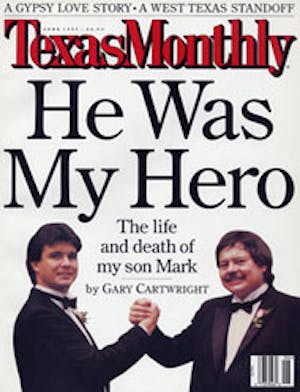IF THE VIETNAM VETERANS Memorial in Washington, D.C., speaks to the heart, then the Archive of the Vietnam Conflict at Texas Tech University in Lubbock nourishes the brain. Whether you’re interested in the massacre at My Lai or the prisoners at the Hanoi Hilton, you’ll find an impressive trove of documents on the struggle that retired U.S. general William Westmoreland calls “the most unpopular war we have ever fought.” And the collection is about to get even more impressive.
The archive was created in 1989 by Jim Reckner, a twenty-year Navy veteran who served two years in Vietnam and is now an associate professor of history at Tech. The idea first came to him after he polled one of his classes and discovered how little they knew about the war. “Only one out of one hundred could tell me that Westmoreland commanded American forces,” he recalls. Less than a decade later, it is the largest collection of Vietnam War documents outside the National Archives—the sort of place where graduate students in history research dissertations on the war and teachers from all over the country come to discuss how the war should be taught. But this month it will double in size when the Douglas Pike Indochina collection, now housed at the University of California at Berkeley, moves to Tech. With the addition of the Pike collection, the archive will contain more than 10 million documents, ranging from highly detailed Army maps of South Vietnam to home movies taken by American GIs, plus an astounding array of material on microfilm and microfiche, including once-secret documents generated by the Pentagon.
Reckner has found a worthy collaborator in Pike, who first went to Vietnam in 1960 as a member of the foreign service and is now the unacknowledged dean of researchers who study the war. Pike believes America has a “psychic need” to examine the conflict and expects the archive will help historians and the American public better understand it. “I don’t think we are going to get our full mental health back in this country until we take the war out of our subconscious and examine it,” he says, adding that Reckner deserves credit for being the “ramrod” behind the archive: “If he weren’t there, it never would have gotten off the dime.”
To attract the Pike collection—and also Pike, who will move to Lubbock this summer to become an adjunct professor of history at Tech—Reckner enlisted the support of several military leaders from the Vietnam era, including retired admiral Elmo Zumwalt. He hopes to make the newly expanded archive a national center of scholarship about the war. While Reckner doesn’t doubt the importance of the Vietnam Veterans Memorial, he believes future generations won’t have an emotional response to it. “In fifty or one hundred years, no matter how powerful it is today, it will be as relevant as the Civil War monuments are to us now,” he says. “When that day comes and people who are seeking answers about U.S. involvement in Vietnam—how America went astray—they will need to come to Texas Tech.”
- More About:
- Texas Tech
- Lubbock






